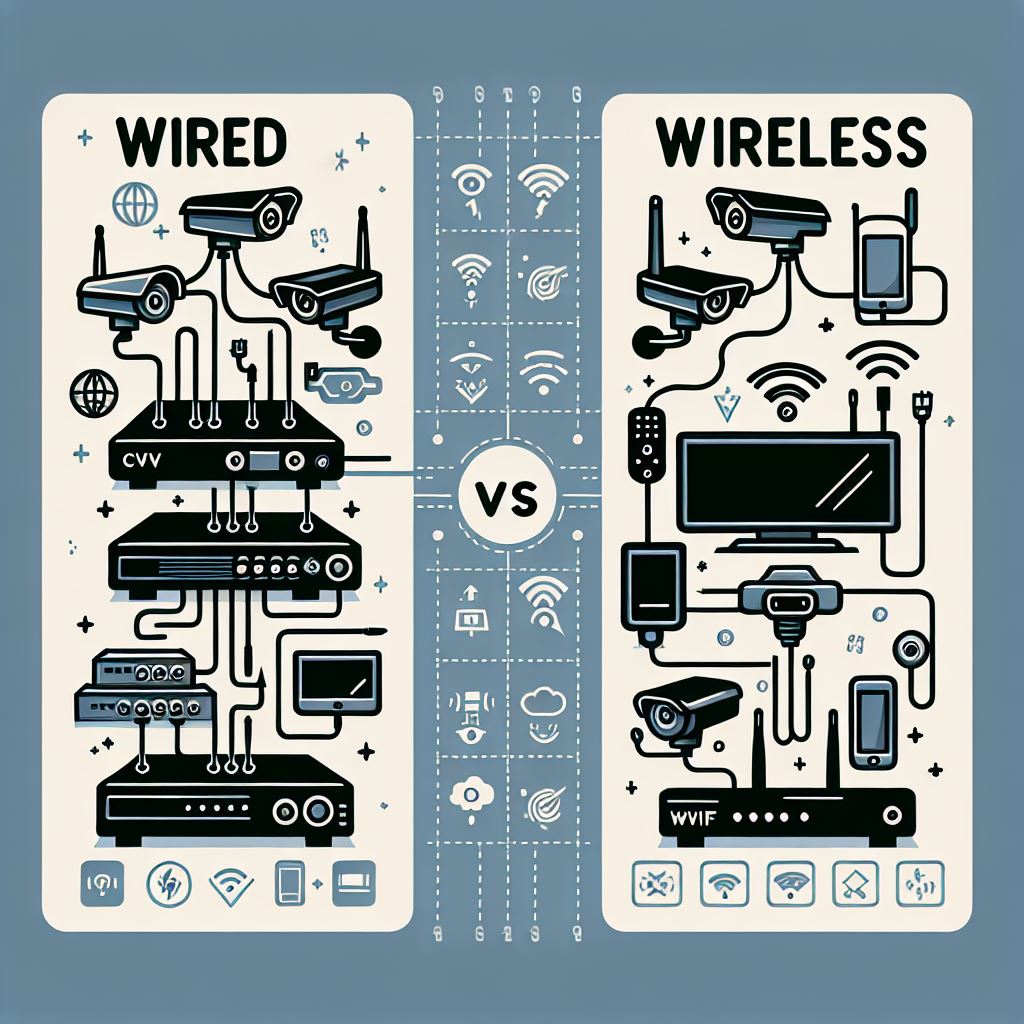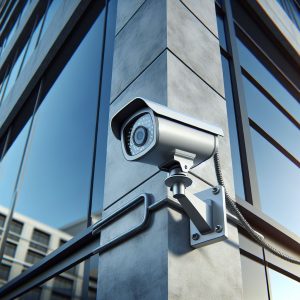One way to make sure that your home doesn’t present itself as a potential target is by equipping it with a home security system. That can include smart locks to protect your door, sensors to detect any unexpected activity and security cameras to keep an eye on it all.
But which security camera is right for you? There are wired cameras and wireless cameras. Each comes with its own set of pros and cons that could make it a good fit for your situation or more of a hassle than you’d expect. I’ll walk you through the difference between wired and wireless security cameras to help you choose which is best for you.
Wired CCTV
A wired CCTV system consists of cameras connected to a recording device, such as a Digital Video Recorder (DVR) or Network Video Recorder (NVR), via coaxial or Ethernet cables. These systems are typically used in environments where a stable and uninterrupted connection is essential, such as in commercial buildings, industrial sites, and residential properties.
A wired home security camera is a security camera that’s hardwired to a full-time power source. These cameras are typically permanently or semi-permanently located around your home, connected via wiring to a central hub that serves as the core of your home security system. The wiring provides electrical power, as well as any internet connectivity and the ability to transmit data and footage to a central location. In some cases, this may be a single cord, like a power over ethernet cable.
With a wired home security camera system, footage can remain local or be viewed remotely depending on the system. Typically, these systems will use a digital video record to store footage for playback. In some cases, a coaxial cable is used to transfer footage from the cameras to the central hub. These systems will typically require a power cable to keep the cameras connected, as well.
Some hardwired cameras operate with internet connectivity, which allows for access via a networked video recorder system. In this case, PoE cables are typically used, and the footage may be accessed remotely.
PROS
Wired home security cameras are hardwired and have a steady connection there is typically no restriction on the quality of video outside of the camera’s capabilities. For that reason, video and audio quality is typically better with a wired home security camera.
Likewise, because a wired security camera is plugged in directly and isn’t reliant on maintaining an internet connection in order to function, it will have a more stable and reliable connection. If the internet goes down, your camera won’t suddenly be offline. It can continue to record and send the footage to a central location.
Here are some advantages for Wired CCTV system:
- Stable Connection – a wired security camera is plugged in directly and isn’t reliant on maintaining an internet connection in order to function, it will have a more stable and reliable connection. If the internet goes down, your camera won’t suddenly be offline. It can continue to record and send the footage to a central location.
- High-Quality Video – These systems often provide higher video quality due to the direct connection between the cameras and the recording device.
- Security Concern – Wired connections are less susceptible to hacking compared to wireless systems, offering an added layer of security.
- Longer Transmission Distances – Wired systems can transmit video signals over longer distances without significant loss of quality, making them ideal for larger properties.
CONS
The biggest downside of a wired home security camera is the “wired” part. These cameras require wires to be run from the central hub all the way to where they are located.
Likewise, most wired home security systems are not very easily changed or moved. If you install a wired home security camera system in your home, you should expect that it will stay with the home if you move. Uninstalling it to take it with you is costly — and then you have to pay to have it installed in the new location, too. In most cases, wired home security cameras are a permanent fixture in the home where they are installed.
While wired CCTV systems have many advantages, they also come with some disadvantages:
- Installation Process – it might take time as it requires running multiple cables. Wired CCTV cameras require physical cables to be run through walls, ceilings, or underground, which can be time-consuming and require professional installation
- Limited Flexibility – when it comes to mounting as they need access to a power outlet. If your property loses power, your security system will be affected as well and another thing is once installed, it cannot be moved again from one place to another as it will involve rerouting of wires which is complicated and costly.
- Aesthetic Impact – people nowadays prefer a cleaner look for their house/establishment, thus wired cctvs can be unsightly especially if installed on the exterior of a building.
- Power Dependency – Wired cctvs might stop working during power outages unless you have a backup power generator.
- Maintenance – Since wired cctvs would include many cables, these connections need regular checking or repair due to wear and tear.
Wireless CCTV
Wireless CCTV don’t require a wired connection in order to operate. Some wireless cameras do still need to be wired for power, but many of them are battery-powered — often referred to as wire-free cameras. Wire-free cameras are typically activated by a sensor and only record when they detect activity in order to preserve power. Wireless systems that plug in are more often always-on systems.
These wireless cameras connect via Wi-Fi. Once they have an internet connection, they can communicate with a cloud server, which is typically where they will send video footage. This footage can be streamed, allowing you to view it in real time, but can also be archived and viewed later with some systems. Some wireless cameras will offer on-board storage that can save some footage, though the amount that can be kept on SD card or USB drive is typically limited.
Wireless home security cameras are typically capable of connecting to other internet-connected devices. This allows them to be integrated into smart home systems. Most are compatible with smart assistants like Amazon Alexa, Apple’s Siri, or the Google Assistant.
PROS
Wireless CCTV have made home security more accessible because they are easy to install and set up. They don’t require any hardwiring like wired cameras, so you won’t have to run electrical wire through your home to connect them. Just place them near an outlet you can plug into or use a battery-powered camera that can be placed anywhere.
For the same reason, wireless CCTV are easy to scale. A wired home security system is limited because of the amount of wiring and work that’s required to set them up. A wireless system can consist of many cameras because they’re more affordable and don’t require much set up to get them online.
Here are some advantages for Wireless CCTV system:
- Easy Installation – Wireless system are easier and quicker to setup or to install, they don’t require extensive cables, your only problem is where should you place them.
- Aesthetics – Without the need for visible cables, wireless systems can be more aesthetically pleasing and less intrusive in your space.
- Flexibility – Wireless cameras can be placed almost anywhere within the range of the network, providing greater flexibility in terms of camera placement and repositioning.
- Scalability – Adding new cameras to a wireless system is often simpler and less costly, as it doesn’t require additional cabling.
- Integration with Smart Home Devices – Wireless CCTV systems can often be integrated with other smart home devices, such as alarms, lights, and door locks, enhancing overall home automation and security.
- Battery-Powered – Some wireless cameras are battery-powered, which means they can continue to operate even during power outages, provided the network is still functional.
CONS
While wireless home security cameras are easy to set up and get online, they also have a less reliable connection. They are prone to losing connection if your wireless network goes down or is unstable for any reason. This can leave you in the dark and unable to access your camera during internet outages.
Because wireless security cameras are connected to the internet at all times, they also present the possibility of being compromised by a hacker. Wireless security cameras can become a vector of attack on your home, though there are steps you can take to protect your privacy.
Wireless CCTV systems have several advantages, but they also come with some limitations:
- Signal Interference – Wireless CCTV can be vulnerable to interference from other wireless devices, such as microwaves, routers, and etc. This may affect the quality and reliability of the video feed.
- Range Limitations – Wireless CCTV is limited by the strength of the Wi-Fi signal. Walls, floors, and other obstacles can hardly reduce the signal range and quality of the video feed.
- Bandwidth Usage – Wireless CCTV can consume significant bandwidth, which might affect the performance of other devices on the same network, especially if you have multiple cameras streaming high-definition video.
- Security Concerns – Wireless systems can be more vulnerable to hacking and unauthorized access if not properly secured with strong passwords and encryption.
- Power Supply: While some wireless cameras are battery-powered, many still require a power source, which can limit their placement options. Battery-powered cameras also need regular recharging or battery replacement.
- Higher Latency: Wireless systems may have higher latency compared to wired systems, which can result in slight delays in the video feed.
CONCLUSION
Deciding whether you want a wired or wireless home security camera system depends on your home’s needs and your expectations for the system. But wired CCTV is the best option. For maximum performance, because video is data heavy. A wired CCTV is better suited for homeowners or businesses with a more permanent location due to the installation time. A wired CCTV requires no battery, wireless CCTV are battery operated, it may lose the battery lifespan in the long run.





